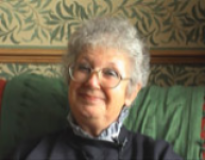Interview OV09

More about me...
Did not expect her diagnosis, which she was told after a scan.
Did not expect her diagnosis, which she was told after a scan.
Whilst I was there I had to go down and have x-rays and a scan, and then they asked me if they could send for my husband. By then it was after lunchtime, my husband was away, away from where he worked at the time in [town] and they had to send for him and it was about 4 o'clock when he arrived at the hospital. I was left in Casualty, still thinking it was fibroids. When my husband arrived the A&E consultant sat him down, sat on the edge of my trolley and said that I had cancer.
She felt more sick with each chemotherapy treatment she had.
She felt more sick with each chemotherapy treatment she had.
The first two sessions were not bad. The third session knocked me for six. It really would, it made me very, very sick. Days it made me sick, lethargic and it probably lasted about a week. And that went on each month thereafter, for the next 4 months, getting progressively worse.
Had an allergic reaction to the morphine she was given for post-operative pain.
Had an allergic reaction to the morphine she was given for post-operative pain.
Said that her husband had become temporarily impotent because sex felt different to him after her treatment.
Said that her husband had become temporarily impotent because sex felt different to him after her treatment.
There is one side effect that is quite embarrassing to talk about but I feel that perhaps it should be noted. It's to do with the sexual side. My husband found that, how he described it as it was empty, and we did find it very difficult, and it maybe that other people perhaps don't know about that side of things and feel perhaps they're the only ones. But there are other ways, but that was a comment that he did say, and it did make him impotent for a couple of years. He's fine now, and as I said, there are other ways, and I find it difficult to talk about but it is something that perhaps people might like to know.
Retired from her job during treatment and then took up voluntary work.
Retired from her job during treatment and then took up voluntary work.
Yes, and the fact that I have more free time now that I've retired during the treatment, and I have always worked, couldn't see me just sitting home doing nothing. I do quite a lot of voluntary work. I've just been appointed as Assistant County Organiser for the National Gardens Scheme, and I started up a garden club in the village last year, and I work for the National Trust, and oh one or 2 other bits and pieces that I do. I can't say that I sat down and thought 'I've got to change my life', it didn't work like that. It sort of by osmosis it crept up from behind and 'oh yes, I'll do that and I'll do this'.
Received visits, cards and flowers from friends and had plenty of people she could phone if she wanted to talk.
Received visits, cards and flowers from friends and had plenty of people she could phone if she wanted to talk.
My husband was wonderful, very, very supportive and friends were superb. I had a lot of back-up from friends, both coming to see me and sending me cards and flowers, it was wonderful.
Yes a great deal of support. I mean, you do tend to get tearful once in a while and I always knew that I could ring somebody up and you do get depressed. Whether that's the drugs I don't know, but there were times when I was quite depressed and I only had to ring somebody up and I could talk, I could ramble, and they'd just let me ramble, and that was great. I didn't do it to [husband] because he needed me to be positive. So I used to take it out on friends.
Explained that her husband did the housework, taking time off when needed, and mopped up after chemotherapy made her sick.
Explained that her husband did the housework, taking time off when needed, and mopped up after chemotherapy made her sick.
Tell me how your husband was supportive?
Kind, very kind. If I wanted to do anything, there was a period when I couldn't drive, he would take me anywhere I wanted to go. He actually was working full-time so he would take time off work if I needed to go anywhere or I wanted to go anywhere. Wouldn't let me do much housework. He tried to find me a cleaner, unsuccessfully, so he took on the role of doing the housework, under duress. And he used to do all the cooking, in fact he still does a lot of cooking now, but he took on the role of doing most of the cooking. And yes, I couldn't have got through the chemo without him. Held my head, held my hand when I was being sick, brought me bowls, sat on the loo with me, well not sat on the loo with me but held my hand in the loo with me. Oh that was something else, it wasn't just being sick, it was both ends and it was unpleasant. And yes, mopping up after me, and that meant quite a lot, because a lot of men would have shied away from that. But yes, I found that very comforting.

